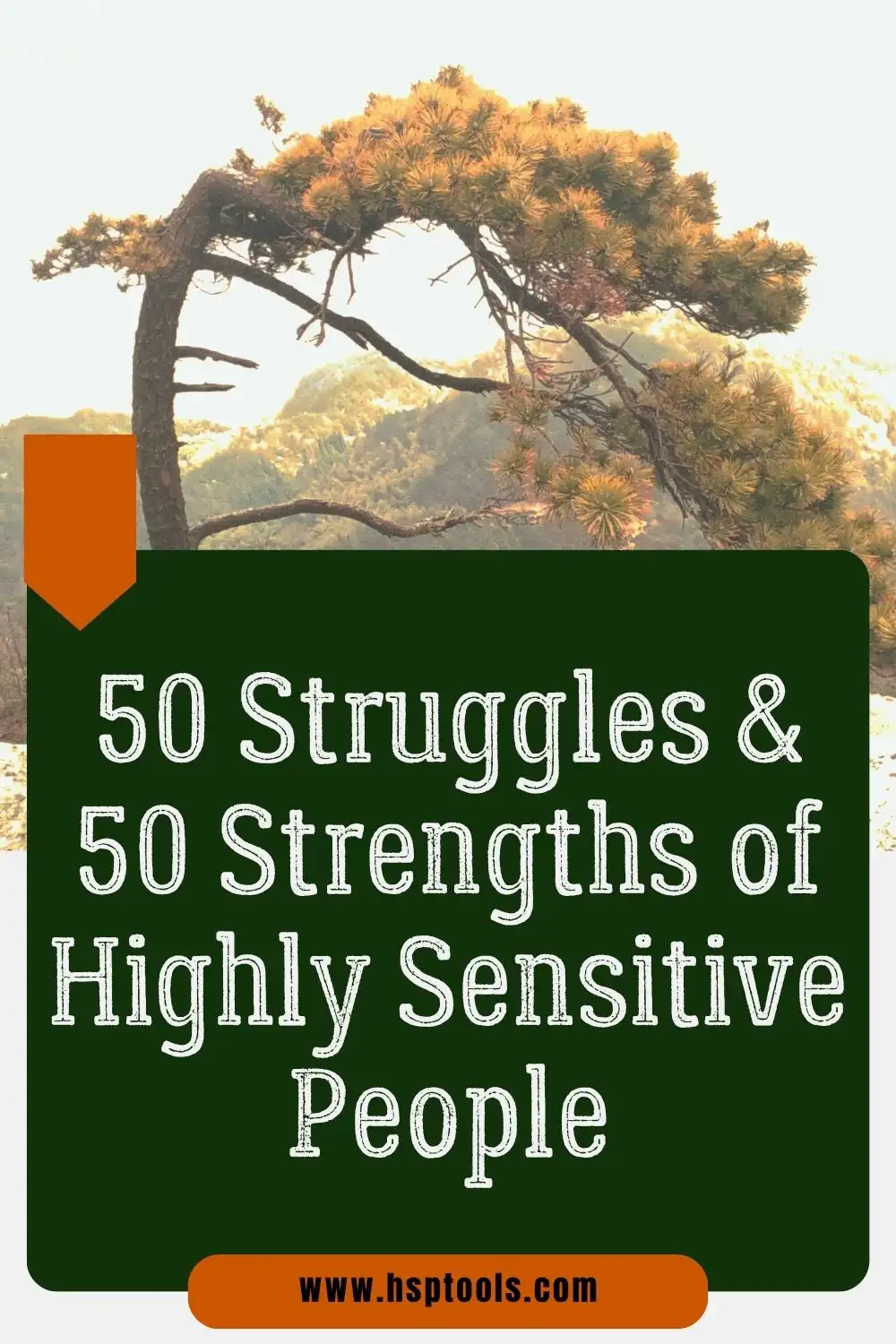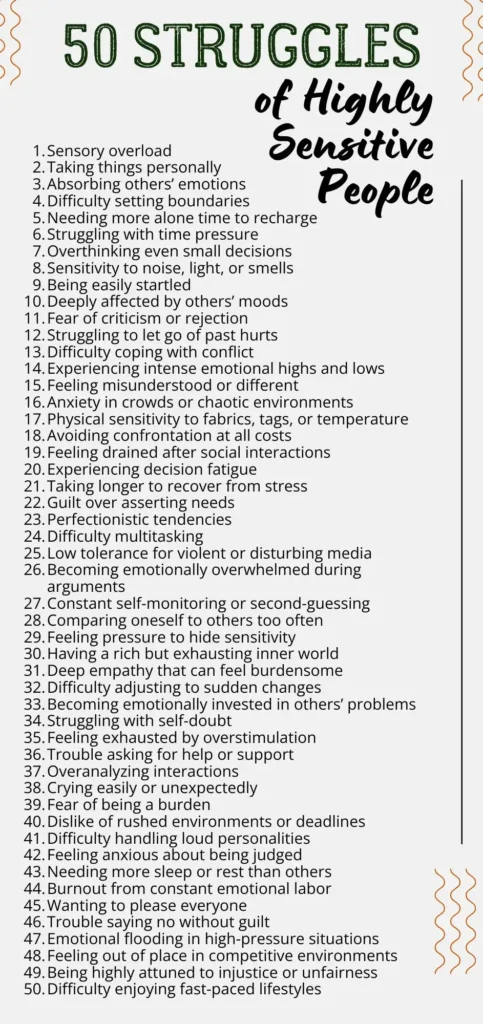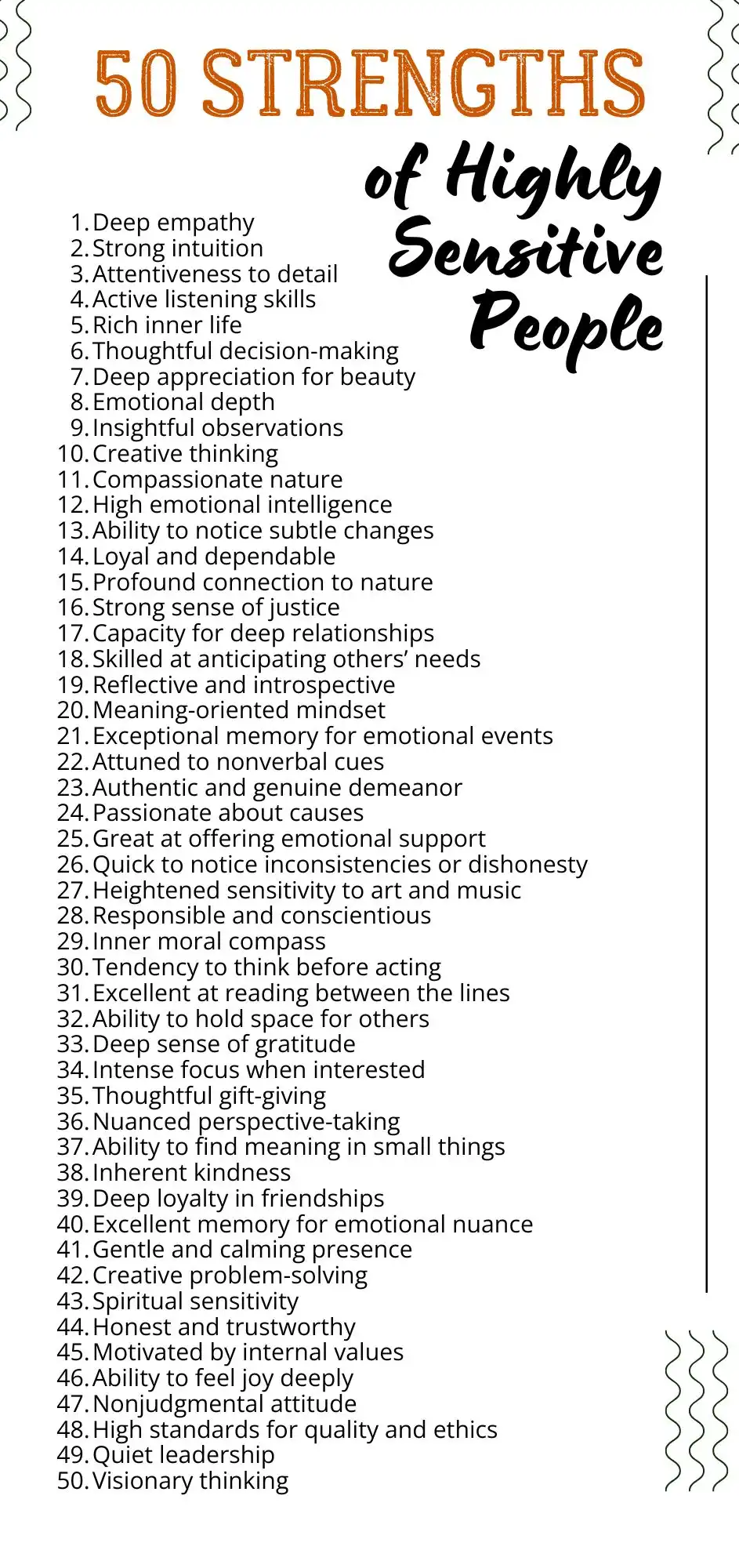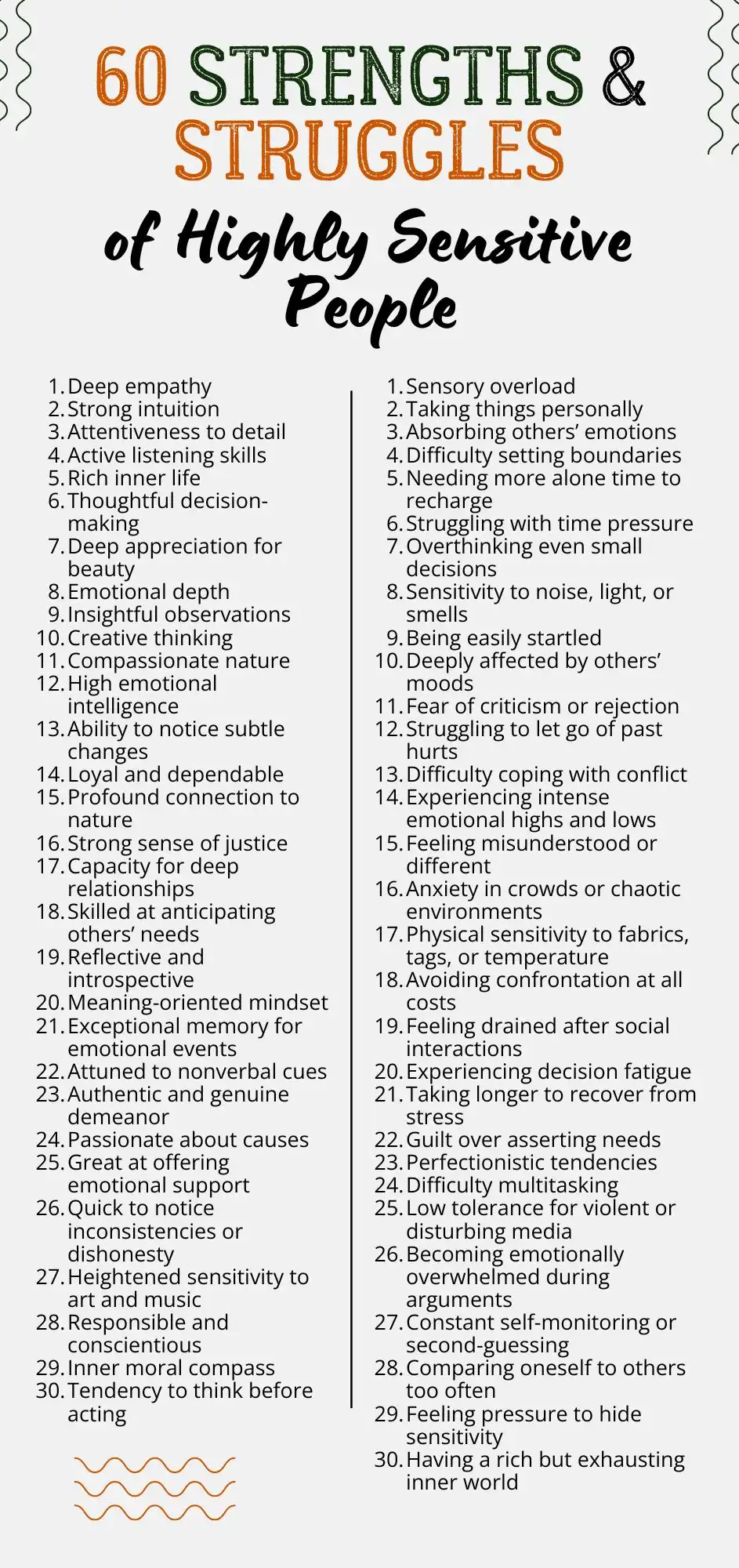The Dual Life of an HSP: 50 Struggles and 50 Strengths of Highly Sensitive People

Being a Highly Sensitive Person (HSP) doesn’t mean you’re weak, dramatic, or broken. It means your nervous system is wired to notice more details, emotions, tension, and beauty.
It also means you process things deeply, need more recovery time, and chances are you’ve been told your whole life that you’re “too sensitive” for reacting the way you do.
But high sensitivity isn’t a flaw. It’s a temperament trait backed by decades of research, including studies by psychologist Dr. Elaine Aron, who first coined the term.
About 20-30% of the population is highly sensitive and the trait shows up in animals too, which means it’s not rare or a condition to treat. It’s just often misunderstood.
In this post, we share 50 Highly Sensitive Person struggles and 50 Highly Sensitive Person strengths.

Disclaimer: This post includes affiliate links, meaning we will earn a commission if you click and purchase. Please know that you never pay extra and all our recommendations are based on products and services we believe in. Also, the text and images in this post were generated with the help of AI.
50 Highly Sensitive Person Struggles
1. Sensory overload
Busy environments, loud noises, bright lights, and constant stimulation can quickly overwhelm an HSP’s nervous system. What others consider normal background activity might feel intrusive or exhausting.
2. Difficulty setting boundaries
HSPs often feel guilty or anxious when saying no, even when they desperately need rest or space. The fear of disappointing others makes boundary-setting feel emotionally risky.
3. Taking things personally
Casual remarks or neutral feedback can feel like personal attacks. Highly sensitive people tend to read between the lines and absorb unintended meanings.
4. Feeling emotionally drained in social settings
Even enjoyable gatherings can be exhausting due to constant sensory input and emotional attunement. HSPs often need alone time to decompress after socializing.
5. Struggling with criticism
Negative feedback, even when constructive, can trigger deep feelings of shame or self-doubt. It often takes longer for HSPs to recover emotionally from criticism.
6. Overthinking decisions
HSPs tend to analyze every possible outcome before choosing, even with simple or routine decisions. The fear of making the “wrong” choice can lead to decision fatigue.
7. Absorbing others’ emotions
It’s easy for HSPs to internalize other people’s feelings as their own. They may leave conversations or spaces feeling heavier than when they arrived.
8. Feeling misunderstood
Many HSPs feel like they’re “too much” or “too sensitive” in a world that values toughness and quick responses. This can lead to loneliness or the urge to hide their true selves.
9. Needing more downtime than others
To process stimulation and emotions, HSPs require more rest and quiet time. Unfortunately, this can be misunderstood as laziness or avoidance.
10. Intense reactions to conflict
Arguments or tension, even when indirect, can feel physically and emotionally distressing. HSPs might withdraw or shut down in order to cope.
Become a Certified HSP Coach in 2026!
Want a career in coaching Highly Sensitive People (HSPs)? The Highly Sensitive Human Academy invites you to join their next professional training cohort starting in May, 2026.
11. Difficulty letting go of negative experiences
HSPs tend to replay difficult moments in their minds long after they’ve passed. Emotional wounds take longer to heal because the impact runs deep.
12. Perfectionism
Wanting to get things “just right” can be both motivating and paralyzing. HSPs often fear that anything less than perfect will lead to judgment or rejection.
13. Being easily startled or overwhelmed by noise
Sudden sounds or loud environments can trigger an intense startle response. This heightened sensitivity to sound makes crowded or unpredictable places hard to tolerate.
14. Trouble with time pressure
Tight deadlines or rushed situations can lead to mental shutdown. HSPs do their best work when given time to think and process without urgency.
15. Avoiding confrontation
Disagreements or tense discussions can feel physically uncomfortable. Many HSPs will go out of their way to keep the peace, even if it means suppressing their needs.
16. Physical sensitivity to textures, lights, or smells
Uncomfortable fabrics, bright lighting, or strong odors can be highly distracting or even unbearable. What others overlook, HSPs feel intensely in their bodies.
17. Anxiety in crowded or chaotic environments
Busy streets, shopping centers, or packed events can quickly become overwhelming. The constant input leaves little room for mental or emotional regulation.
18. Guilt for saying no
HSPs may feel like they’re letting others down when they decline invitations or requests. This guilt often pushes them to say yes, even when they’re already overstretched.
19. Feeling pressure to fit in
Highly sensitive people often notice how different they are from those around them. This can create internal pressure to hide their sensitivity in order to be accepted.
20. Difficulty handling change or unpredictability
Sudden changes in plans or environment can cause stress or confusion. HSPs thrive with structure, familiarity, and time to prepare.

21. Taking longer to recover from stress
HSPs often need more time to bounce back after emotionally or physically demanding experiences. What feels like a minor stressor to others can linger for days.
22. Guilt over asserting needs
Even when advocating for themselves, HSPs may feel selfish or demanding. They often downplay their needs to avoid making others uncomfortable.
23. Feeling emotionally exposed after vulnerability
Opening up can feel risky, even when the environment is safe. After sharing something personal, HSPs may experience a vulnerability hangover and question whether they said too much.
24. Difficulty multitasking
Managing multiple tasks or streams of information at once can feel overwhelming. HSPs generally function better when they can focus deeply on one thing at a time.
25. Low tolerance for violent or disturbing media
Graphic scenes or intense content can feel too real and stay with HSPs long after exposure. They may avoid certain films, shows, or news to protect their emotional well-being.
26. Becoming emotionally overwhelmed during arguments
Raised voices or intense emotions can trigger a fight-or-flight response. HSPs often need space to regulate before they can communicate clearly again.
27. Constant self-monitoring or second-guessing
HSPs often reanalyze what they said or did in a conversation. This internal replay can lead to doubt, even when nothing went wrong.
28. Comparing oneself to others too often
HSPs are highly aware of their environment, which can lead to constant comparison. This habit can undermine self-esteem, especially when they feel “behind.”
29. Feeling pressure to hide sensitivity
Because sensitivity is often misunderstood, HSPs may mask their reactions to avoid judgment. Over time, this suppression can feel exhausting and inauthentic.
30. Having a rich but exhausting inner world
The internal life of an HSP is full of imagination, reflection, and emotional depth. While beautiful, it can also be mentally draining without time to unwind.
31. Deep empathy that can feel burdensome
HSPs often care deeply about the pain of others, sometimes to the point of emotional exhaustion. It’s hard to draw the line between compassion and overextension.
32. Difficulty adjusting to sudden changes
Unexpected shifts in plans or environments can throw HSPs off balance. They typically need time to mentally and emotionally recalibrate.
33. Becoming emotionally invested in others’ problems
Even when it’s not their responsibility, HSPs may feel compelled to fix or carry the emotional weight of other people’s issues. This can lead to burnout and blurred boundaries.
34. Struggling with self-doubt
Because of their deep thinking and sensitivity to feedback, HSPs often second-guess their decisions and abilities. This internal doubt can stall progress or create unnecessary stress.
35. Feeling exhausted by overstimulation
When the world feels too loud, too fast, or too full, HSPs may experience both physical and mental fatigue. Rest becomes essential, not optional.
36. Trouble asking for help or support
Many HSPs hesitate to reach out for help out of fear they’ll be seen as weak or needy. They often carry more than they should to avoid being a burden.
37. Overanalyzing interactions
HSPs may replay conversations in their minds, dissecting tone, word choice, or body language. This tendency can lead to anxiety and social fatigue.
38. Crying easily or unexpectedly
Strong emotions rise quickly for HSPs, especially in moments of beauty, sadness, or frustration. Tears are not always a sign of distress but can still feel exposing.
39. Fear of being a burden
Even when they have legitimate needs, HSPs may hold back to avoid “taking up too much space.” This fear can keep them from asking for what they truly need.
40. Dislike of rushed environments or deadlines
HSPs tend to shut down when forced to move too quickly. They value depth and quality, which are often sacrificed in high-pressure situations.
41. Difficulty handling loud personalities
HSPs may feel overwhelmed or drained by people who dominate conversations or speak aggressively. It can be hard to find space for their own voice in these dynamics.
42. Feeling anxious about being judged
Because they process everything deeply, HSPs often worry about how they’re being perceived. Even neutral attention can feel like scrutiny.
43. Needing more sleep or rest than others
Mental and emotional processing takes a toll, making rest crucial for HSPs. Without it, they can feel overstimulated, irritable, or foggy.
44. Burnout from constant emotional labor
HSPs often provide emotional support to others without realizing how much it drains them. They may not notice their own depletion until it’s too late.
45. Wanting to please everyone
Saying yes feels easier than disappointing someone. Over time, this people-pleasing habit can lead to resentment or identity loss.
46. Trouble saying no without guilt
Even when boundaries are necessary, HSPs often feel they have to justify or apologize for them. The discomfort of disappointing someone can outweigh their own needs.
47. Emotional flooding in high-pressure situations
Under stress, HSPs may feel overwhelmed by the intensity of their own reactions. This emotional overload can make it hard to think clearly or respond effectively.
48. Feeling out of place in competitive environments
Aggressive, fast-paced cultures can feel abrasive or unsafe. HSPs may shrink back or disengage to protect their well-being.
49. Being highly attuned to injustice or unfairness
Even small acts of unkindness or inequality can feel intolerable. HSPs are often deeply affected by what others might dismiss.
50. Difficulty enjoying fast-paced lifestyles
A constant push for productivity, performance, or hustle can quickly lead to burnout. HSPs tend to thrive in slower, more intentional environments.

50 Highly Sensitive Person Strengths
If the first half of this list felt a little too real, you’re not alone. Highly Sensitive Person struggles are often invisible to others but deeply felt by those who live with them every day.
But sensitivity isn’t just about overstimulation or emotional overload. The same nervous system that makes you susceptible to burnout is also what allows you to experience life with depth, insight, and care.
It’s not either-or, it’s both. And for every HSP struggle, there’s often an HSP strength that mirrors it. Below are 50 Highly Sensitive Person strengths that come naturally to HSPs.
1. Deep empathy
HSPs often understand what others are feeling without needing words. This emotional insight allows them to connect in honest, supportive, and meaningful ways.
2. Strong intuition
Their sensitivity to subtle details helps HSPs pick up on things others miss. Often, their gut instincts are grounded in quiet but accurate observations.
3. Attentiveness to detail
From body language to overlooked patterns, HSPs tend to notice the fine print of life. This makes them thoughtful contributors, careful planners, and sharp observers.
4. Active listening skills
Rather than just waiting for their turn to speak, HSPs truly hear people. They process what’s said with care, often asking deeper follow-up questions that build trust.
5. Rich inner life
Imagination, reflection, and introspection are constant companions for HSPs. This internal depth often fuels creativity and meaning-making.
6. Thoughtful decision-making
HSPs rarely act impulsively. They consider how decisions will affect themselves and others, which makes their choices intentional and informed.
7. Deep appreciation for beauty
Art, music, nature, and even small moments of harmony can move an HSP profoundly. They often find awe in things others pass by without noticing.
8. Emotional depth
HSPs don’t just feel emotions — they experience them in full color. This depth brings richness to their relationships and personal insights.
9. Insightful observations
Because they absorb so much information, HSPs often draw connections others don’t see. Their ability to notice patterns makes them naturally insightful.
10. Creative thinking
Their imaginative minds and ability to connect ideas allow HSPs to approach problems from unique angles. Creativity often becomes a natural outlet for their emotions and observations.
11. Compassionate nature
HSPs are often the first to offer comfort, support, or a listening ear. Their ability to feel what others feel makes their compassion both sincere and immediate.
12. High emotional intelligence
They understand not just their own emotions but also those of the people around them. This emotional literacy helps them navigate relationships with care and awareness.
13. Ability to notice subtle changes
Whether it’s a shift in tone, mood, or energy, HSPs catch what others miss. This sensitivity can help them prevent misunderstandings or spot problems early.
14. Loyal and dependable
When an HSP commits, they show up with their full presence and follow-through. Their loyalty runs deep, especially with people who respect their sensitivity.
15. Profound connection to nature
HSPs often feel deeply grounded in natural settings. The quiet, beauty, and stillness of nature help regulate their nervous systems and spark a sense of belonging.
16. Strong sense of justice
They’re quick to notice unfairness and are often vocal advocates for those who are overlooked or mistreated. Their empathy translates into action.
17. Capacity for deep relationships
HSPs don’t do surface-level connection well. They seek and create bonds that are emotionally rich, reciprocal, and long-lasting.
18. Skilled at anticipating others’ needs
Their high attunement makes them naturally responsive. HSPs often notice what someone needs before that person asks for it.
19. Reflective and introspective
Self-awareness is a natural strength for most HSPs. They regularly evaluate their own patterns, choices, and emotions, which fosters personal growth.
20. Meaning-oriented mindset
HSPs crave depth and authenticity in what they do. They’re driven not just by outcomes but by purpose and alignment with their values.
21. Exceptional memory for emotional events
HSPs often remember not just what happened, but how it felt. This emotional recall helps them learn from past experiences and respond with depth in future situations.
22. Attuned to nonverbal cues
Whether it’s tone, posture, or facial expressions, HSPs pick up on what isn’t being said. This makes them highly perceptive in both personal and professional settings.
23. Authentic and genuine demeanor
There’s rarely anything performative about an HSP. They show up as they are, and others often feel safe to do the same.
24. Passionate about causes
When something aligns with their values, HSPs give it their all. Their passion is often rooted in a desire to create a more compassionate world.
25. Great at offering emotional support
Highly Sensitive People don’t just offer comfort, they hold space in a way that feels grounding and safe. Their presence alone can be healing for others.
26. Quick to notice inconsistencies or dishonesty
HSPs sense when something’s off, even if it’s subtle. They’re often the first to detect when someone isn’t being truthful or sincere.
27. Heightened sensitivity to art and music
Music, design, and visual beauty often touch HSPs at a soul-deep level. They don’t just enjoy art — they feel it.
28. Responsible and conscientious
Doing a job well and ethically matters to HSPs. They care about outcomes, but they also care about the process and integrity behind them.
29. Inner moral compass
They don’t need external validation to know what feels right or wrong. HSPs often operate from a strong internal code of ethics.
30. Tendency to think before acting
They rarely rush into decisions or conversations. HSPs naturally pause, reflect, and consider the impact of their actions.
31. Excellent at reading between the lines
HSPs often sense what people mean even when they’re not saying it directly. They pay attention to tone, pauses, and subtext, not just the words.
32. Ability to hold space for others
They can sit with someone else’s pain or discomfort without rushing to fix it. This makes HSPs deeply supportive and emotionally available friends or partners.
33. Deep sense of gratitude
HSPs often notice and appreciate small acts of kindness, beauty, or meaning. Their ability to feel deeply includes the ability to feel thankful in a way that’s sincere and lasting.
34. Intense focus when interested
When something matters to them, HSPs can enter a deep state of focus and flow. Their concentration can be powerful and highly productive when conditions are right.
35. Thoughtful gift-giving
Because they’re attentive to others’ preferences, HSPs often give gifts that feel unusually personal or meaningful. They remember the little things that others mention in passing.
36. Nuanced perspective-taking
HSPs naturally consider multiple viewpoints before forming opinions. This makes them open-minded, fair, and often great at navigating complex issues.
37. Ability to find meaning in small things
A passing comment, a quiet sunrise, or a handwritten note can hold great emotional value for an HSP. Their world is full of small, powerful moments.
38. Inherent kindness
Their deep awareness of how others feel often makes HSPs gentle in both action and word. They tend to avoid harming others, even unintentionally.
39. Deep loyalty in friendships
When an HSP builds trust, they commit fully. They’re the type of friend who remembers anniversaries, checks in regularly, and stands by you through hard seasons.
40. Excellent memory for emotional nuance
HSPs don’t just remember facts, they recall how things felt, what was said, and the emotional tone in a room. This makes their recall of emotional events highly detailed and vivid.
41. Gentle and calming presence
HSPs often bring a quiet, grounding energy to the spaces they enter. Their softness can create a sense of safety for others without needing to say much.
42. Creative problem-solving
They naturally approach challenges from angles others may not consider. Their deep thinking and emotional insight often lead to thoughtful, human-centered solutions.
43. Spiritual sensitivity
Many HSPs report feeling deeply connected to something larger than themselves — whether through nature, intuition, or faith. Their sensitivity often extends beyond the physical or emotional to the spiritual.
44. Honest and trustworthy
Because authenticity matters to them, HSPs tend to speak and act with integrity. People often sense that they can be trusted with vulnerable truths.
45. Motivated by internal values
Rather than chasing external rewards, HSPs are guided by personal meaning and purpose. This alignment gives their actions a sense of direction and depth.
46. Ability to feel joy deeply
HSPs don’t just feel negative emotions strongly — they also experience happiness, beauty, and awe in vivid detail. Their capacity for joy is often intense and life-affirming.
47. Nonjudgmental attitude
They tend to hold space for complexity rather than rushing to label or criticize. This makes them accepting companions to people from all walks of life.
48. High standards for quality and ethics
Whether in relationships, work, or creativity, HSPs are rarely satisfied with “good enough.” They care about how things are done, not just that they’re done.
49. Quiet leadership
HSPs may not seek the spotlight, but they often lead by example. Their calm presence, thoughtfulness, and emotional intelligence earn respect without force.
50. Visionary thinking
Their ability to reflect deeply, connect dots, and imagine better ways of doing things gives HSPs a natural edge in long-term thinking. They often dream big — not for attention, but because they genuinely care about what’s possible.

Final Word on 100 HSP Struggles & Strengths
If you saw yourself in these 100 points, that’s not a coincidence. Highly Sensitive People feel deeply, think deeply, and respond to the world in ways that aren’t always visible to others.
But that doesn’t make your experience any less real.
Yes, sensitivity is often overwhelming. But it can also bring clarity, empathy, creativity, and insight that the world sorely needs.
So, no: you don’t have to toughen up or tone yourself down. You only need the right tools and support to thrive.
If you’re looking for practical resources like books, courses, podcasts, or community spaces to help you navigate life as an HSP, you can download our comprehensive guide with 300+ resources made specifically for Highly Sensitive People.
You don’t have to figure this out alone. There’s an entire world of support built for people just like you.








